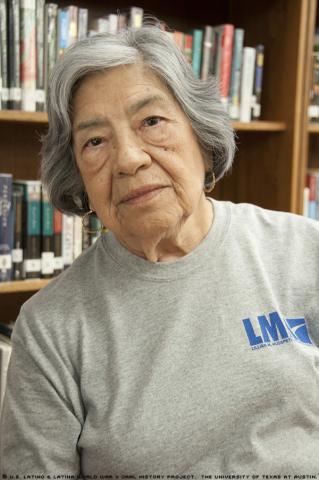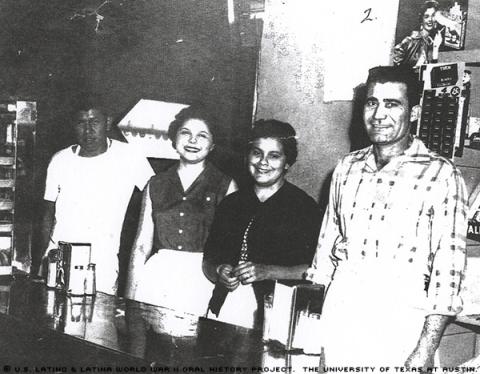

By Mary Mejia
In 1938, Vicenta Sanchez Lopez became the first Mexican American woman to graduate from her high school in her predominantly Anglo home town of Sonora, Texas, about 200 miles west of Austin. Just one year earlier, the first Mexican American man graduated from Sonora High School.
From the 1920s to the 1940s, she said, Anglos controlled Sonora and discriminated against minorities.
After his first wife died of smallpox, López’s father, Enrique Sanchez, immigrated to the United States from Mexico in 1916. He left his son, Estanislao, with his in-laws in Mexico. Sanchez was a dishwasher at a saloon in Sonora. Later, he moved to Ozona, Texas, 126 miles north of Del Rio, again working as a dishwasher.
It was in Ozona that he met López’s mother, Juanita Longoria. She had two sons from her previous relationships.
The couple married in 1920 and moved to Sonora in 1921. Sanchez returned to Mexico to bring his son, Estanislao, to live with the new family. The Sanchezes had two more children together: Vicenta in 1938 and Ernesto in 1922. Ernesto died of scarlet fever in 1926.
Sanchez opened El Phoenix Café, in Sonora, which served chile con carne, soup and huevo rancheros. The café was the only restaurant that served Mexican Americans and Anglos. All the other restaurants were whites only. “He still prospered because the same men that were his clients at the saloon when he started working in Sonora … would come to his place and eat,” López said.
Sanchez was respected by Anglos, so the Sanchez family faced less discrimination than other Mexican Americans, she said. Some Anglos in power believed that the café owner was influential. The sheriff was in office for about 20 years, and every year, according to López, the sheriff paid Sanchez to tell customers to vote for him. Sanchez said he would but never did. The sheriff also gave Sanchez a poll tax receipt that allowed Sanchez to vote without citizenship.
López learned how to read and write in Spanish. When she was 7, she attended the L.W. Elliott school, a Mexican school that only taught in English. The school had only one classroom and one teacher. Six grades were taught in this one classroom by this one teacher. Very few students, including Lopez, continued their education.
At Sonora High School, the school librarian and history teacher, Annie Duncan, asked Lopez to work with her at the library for 50 cents an hour. Lopez, who loved to read, took this opportunity to read as much as she could. “She wanted to widen my reading habits,” Lopez wrote later.
On her first day on the job, Lopez remembered, the school librarian asked her to go to the public library and check out some books for her. She gave Lopez a note that told the public librarian that the young woman was authorized to check out books for her. But the librarian refused to let López check out any books because the library didn’t “serve Mexicans.” Lopez was upset, but she knew there was nothing she could do. Duncan told her she would get the books herself and share them with her.
She was the first Latina to graduate from Sonora High School. She was 17 years old.
A woman who owned a San Angelo business school invited Lopez to attend the school. She also spoke to Lopez’s parents. Her father was able to afford it and approved, but he said her mother had to join her. “I said, ‘I’m not going to school with my mother,’ ” López remembered. “So … I didn’t go.”
Her dream of attending college gone, at age 19 she married José Santos López, who lived nearby.
José Lopez was from Mexico, had a third grade education, was an orphan, and lived with his married sister and two brothers. He sheared sheep for a living.
On May 25, 1941, her daughter Diana was born. The U.S. entered the World War II almost seven months later. Her son Lemuel was born on March 7, 1944.
López’s brother, Jesus Sanchez, and her husband fought in WWII. Sanchez volunteered with the Army before the war began, and her husband was drafted after the war began. Her husband was wounded during the Battle of Okinawa in 1945. He received a Purple Heart and received $80 a month as a pension. When he returned from the war in 1946, he was appointed to the Draft Board in Sonora. Sanchez served in North Africa and fought in the Battle of the Bulge.
After the war, Lopez remembered, the general attitude in Sonora towards Mexican Americans changed. “We had hundreds of our men -- Latinos -- going off,” she said. “And when they came back things were so much better. Not that it was 100 percent, but they were much better.” She thought that the Latino population was treated with greater respect.
After 25 years of managing El Phoenix Café, Enrique Sanchez was tired. He handed over the business to his daughter and her husband in 1946. José Lopez learned how to cook during basic training, and he applied that experience, adding chicken fried steaks and hamburger steaks to the menu. They received more business from Anglos, and the restaurant prospered.
“[It was] the only Mexican restaurant in town, and there was an American restaurant, so only two in town. So we had no competition,” said López. “We re-named it the Commercial Restaurant,” she added later.
López had her third child, José Eliel, on May 13, 1946, and needed help with the restaurant. Her brother helped her for several months when he returned from the war. She also employed high school students and assisted them with their education.
Lopez and her husband focused more on their children’s lives and education as others handled the restaurant. She served as PTA secretary, the second Mexican American to hold that position. She and her husband stressed the importance of education to their children and encouraged all of them to attend college, which they did. Lopez did as well, at last attending the San Angelo business school for six months to learn how to better administer her restaurant.
José Lopez was active with the Lions Club, and he served one term as president. He was also involved with the League of United Latin American Citizens.
He suffered an aneurysm at age 53 and died in 1973.
After 27 years, Lopez handed over management of the Commercial Restaurant to her son Lemuel. She continued to work as a cashier. Her son managed the café for 23 years, closing it in 1973. The restaurant was open for 75 years. Lopez had served as cashier, cleaning lady, bookkeeper and manager.
“I’m proud of that. If there is anything in my life that has … well, I won’t say has broken my heart … was letting go of the business,” said Lopez.
In 1975, she married Leopoldo Cervantes, a truck driver and ranch manager. López owned one of the two convenient stores in Sonora. It was doing well, but as more people started moving into Sonora, she worried about other convenient stores opening. She sold her store.
Cervantes wanted to own a mobile home park and had the land, but no mobile homes. She assisted by financing old mobile homes and fixing them. After they divorced in 1988, López sold one of the parks.
Lopez remained active in her community, serving on a zoning board, working at a senior center and assisting the local church.
Her daughter went to nursing school and married a physician. They moved to Alaska because the husband had a partnership there with another doctor. Her daughter was always interested in art and decided to open her own gallery instead of being a nurse. López supported her daughter by giving her money to buy the gallery.
López, now retired, is a proud mother, grandmother, and great grandmother as she sees each generation of her family embracing education. She regrets not attending college and advises everyone to get a college degree.
“Never stop learning. … Read, read, read,” López said.
(Mrs. Lopez was interviewed in Sonora, Texas, on Aug. 2, 2010, by Taylor Peterson.)

